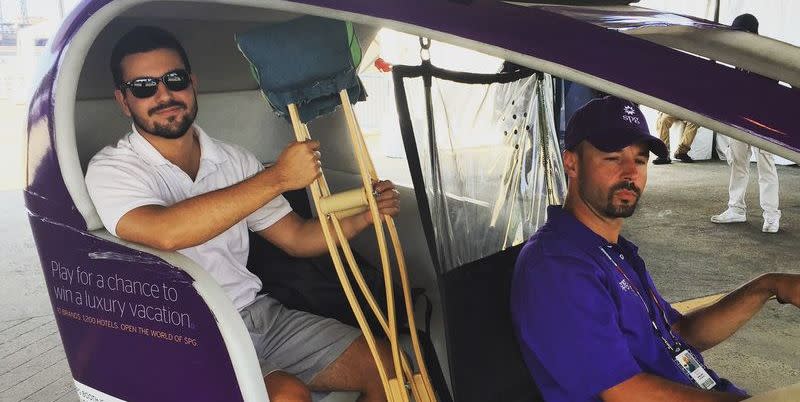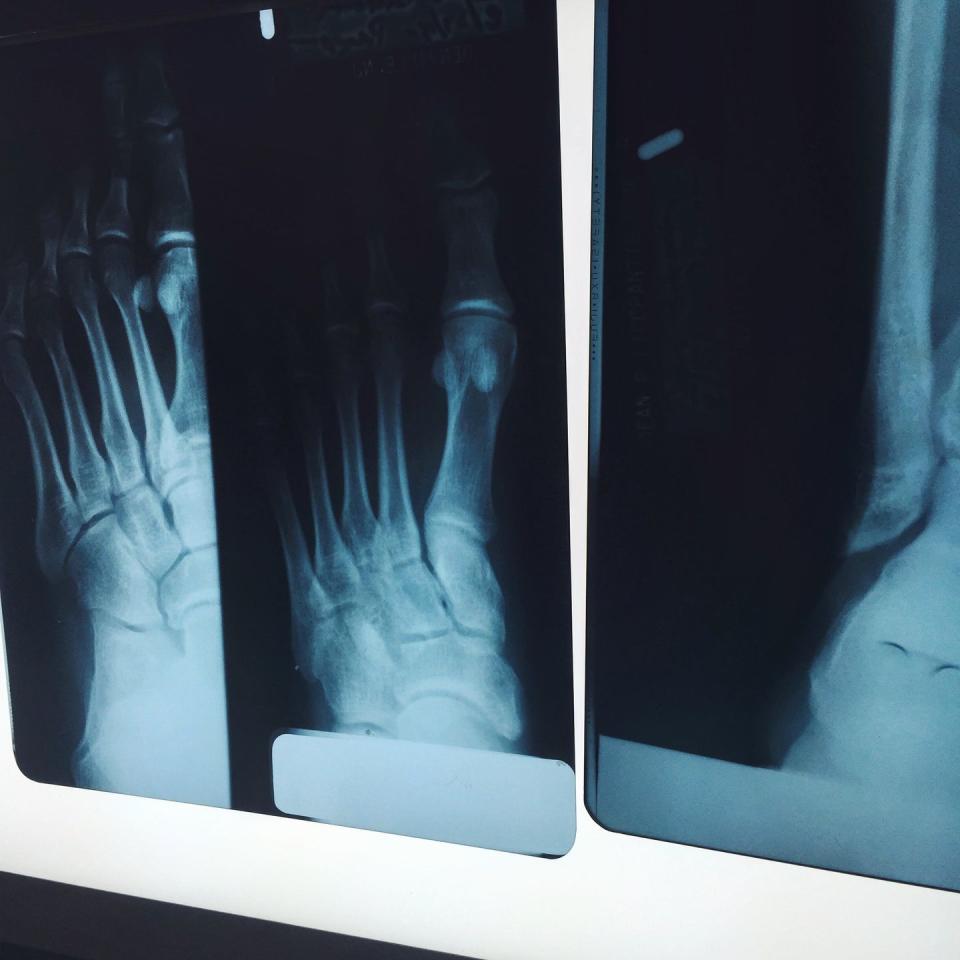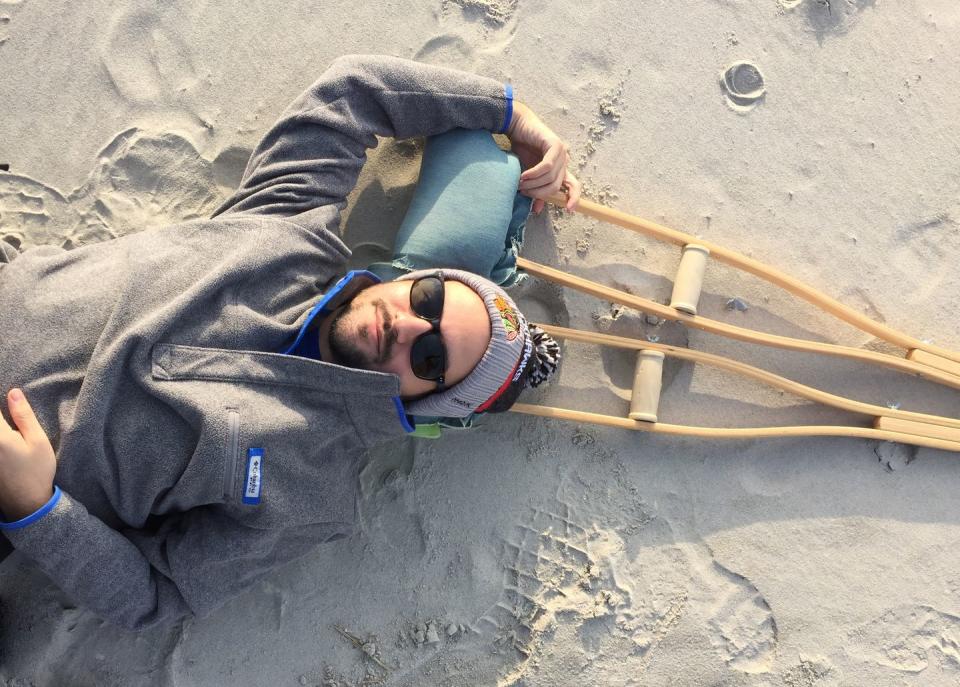What It’s Like To Go On Workers’ Comp At Age 24

As a fresh college grad, I began my career as an Art Director at an experiential advertising agency in New York City. It was the ideal way to kick off my career -- a work hard/play hard mentality, organized happy hours, business travel, and coworkers you’d actually want to hang out with outside of work. It was all fun and games until someone got hurt...and that someone happened to be me.
I was working at an event that my company hosted for our client during the Tennis U.S. Open. As I was getting ready to leave the event, I stepped off a curb onto uneven pavement in the dark, royally messing up my foot with an unsettling crack. Embarrassed and with too much pride, I (regrettably) managed to limp my way home to New Jersey via public transportation instead of hailing an Uber. The next day, a doctor informed me that my fifth metatarsal was fractured. Quick explainer: Your fifth metatarsal controls a tendon that goes up your leg, so it was extremely important for me to stay off of my foot. If I chose to ignore the doctor's orders and walked around with the pain, the tendon would have pulled the fracture further apart. I didn’t walk for four months, followed by two months of physical therapy, and then fashioned a cane for three months.

The lowest point of my time disabled wasn’t actually from the injury itself, but rather the unnecessary backlash I faced from my workplace. As an employee who was well-liked with a good track record at the company, the name I made for myself would soon be forgotten. It’s not common for younger professionals like me to endure the process of workers’ comp, and I was naive to the process so early in my career. There were things that I wish someone had told me, red flags I wish I’d known to look out for. This is what it was like to go on workers’ comp at age 24...
Nothing Can Mentally Prepare You To Not Walk For Months on End
It was a chapter of new normals for me. My daily routine involved crawling up and down the stairs just to grab something to eat or go to the bathroom. I was grateful to have my parents there to help me adjust and keep me sane, but I also had to figure things out on my own. What kept me positive (most of the time) is that I knew I was going to get better. I was going to be able to walk again -- I was lucky. I gained a perspective that helped me see the big picture, and to realize that small stuff I used to stress about didn’t really matter.
Don’t Apologize For Prioritizing Your Health Over Your Job
Admittedly, I didn’t really know what workers’ comp was. When I went to HR after the accident, I was told that my injury "wasn’t bad enough" to go on workers’ comp with no additional options. I didn’t know what to do. My commute to work was 2 hours (each way) and being on crutches on the busy (and dirty) streets of New York City seemed like the worst thing that I could do for my broken foot.
I found the employee handbook on the company’s server and emailed the contact listed to apply for workers’ comp. This didn’t go over well. My decision left my colleagues feeling frustrated, believing that I went behind their backs seeking this payout. I saw this as my only option and I don’t regret prioritizing my health.
Know Your Rights
The nurse assigned to my workers’ comp case worked remotely (1,000 miles away from me in the midwest), so I only spoke to her on the phone and we never met in person. She tried to take advantage of my lack of knowledge about workers’ comp (there is no universal guide to navigate this process) and crucial information was not properly presented to me.
One day she sent another nurse to my doctor’s appointment (without my knowledge) where she tried to enter the examination room -- which is illegal without consent. I later found out that she took my file off of the door as she was waiting outside the room and returned it the next day after claiming she "accidentally found my folder in her bag." I’m not sure what she thought we were hiding, as if my doctor and I had an elaborate scheme.

The Isolation From Work Took a Mental Toll
I started to think my work email was malfunctioning (it wasn't) because I rarely got responses to my emails over the four months I was working from home -- corporate ghosting. This was a true testament to find out who had my back, and there were some that I know stood up for me when I wasn’t in the room to defend myself. I was trying to get better but feeling the hostility from my workplace through my screen eventually broke me beyond just my foot. This overwhelming animosity made me lose control of myself for a while. I dropped 30 lbs in three months and I started to hide away in my house for weeks at a time.
Returning to Work Post-Injury Made Things Even Worse
In the months after my return to work, I couldn’t go a day without a colleague bringing up my injury like some form of blackmail. It was a looming cloud above my head. I didn’t want to quit because I felt like that was letting them win. It reached a point where a Chief Officer walked up to me and said, "I’m going to break your other f*****g foot." I figured it was time to get HR involved, but the person only asked me in a wandering voice, “Was he joking? Was he drunk?”
Through all the noise and drama, all I cared about was getting back to feeling 100%. Although I won't say I'm glad this happened, I do believe I grew from this experience. I learned firsthand how a dream job could quickly turn into a nightmare and I was no longer the naive recent graduate seduced by the allure of office happy hours and beers with the boss. I lost trust in colleagues as I returned to work and became distant from some I was once close with. Ultimately I challenged myself to stick it out for as long as I could. Some colleagues left the company and it eventually reached a point where my injury wasn't my reputation anymore. I've since moved on from the company, but I took with me a stronger sense of my worth as an employee that can be applied wherever my career takes me.
You Might Also Like